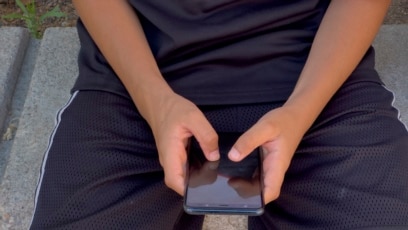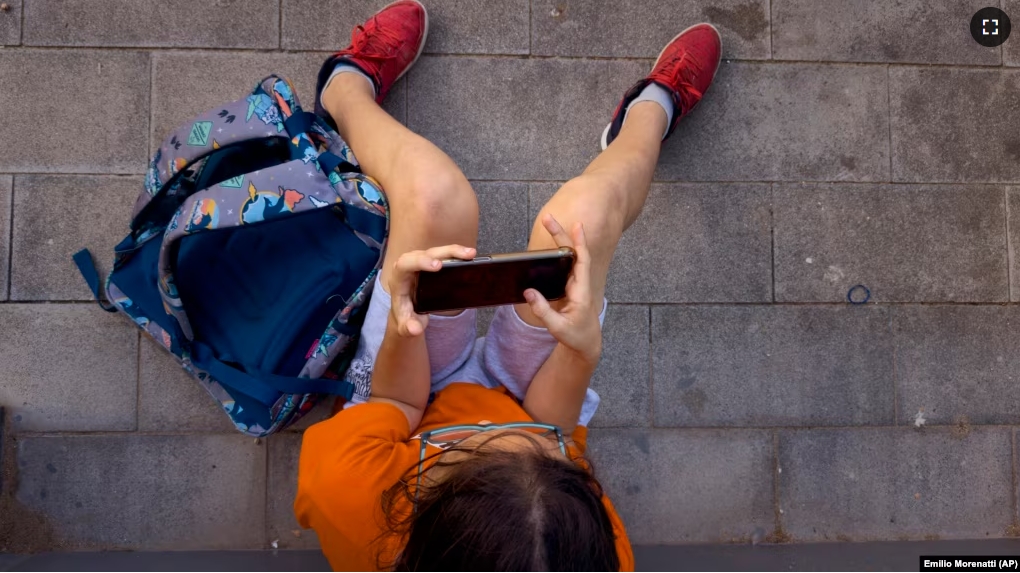If parents say “no” when a child asks for a smartphone, the response they are likely to hear is, “Everyone has one. Why can’t I?”
But what would happen if the child’s friends did not have a mobile phone either?
That is the way that some parents in Europe are thinking.
They are concerned by evidence that smartphone use among young children threatens their safety and mental health. They believe that the more parents join their movement, the more powerful their ideas become.
Parents in Spain, Britain and Ireland are using social media groups on services like WhatsApp and Telegram to talk about their plans. They want to keep smartphones out of schools. But for their plan to work, other parents have to refuse to buy children the devices before — or even into — their teenage years.
Elisabet García Permanyer got involved after she talked with another parent in a Barcelona park. Last year, she started a social media group to share information on the dangers of the internet with families at her children’s school.
The group, called “Adolescence Free of Mobile Phones,” quickly grew and now includes over 10,000 members. The most involved parents are asking other parents to agree not to get their children smartphones until they are 16.
“When I started this, I just hoped I would find four other families who thought like me, but it took off and kept growing, growing and growing,” García Permanyer said. “My goal was to try to join forces with other parents so we could push back the point when smartphones arrive. I said, ‘I am going to try so that my kids are not the only ones who don’t have one.'”
Spain
Police and public health experts have also been voicing concerns about the kind of materials that children can see on their mobile devices. Spain’s government took note of the problem and banned smartphones from elementary schools in January. Now they can only be turned on in secondary school, which starts at age 12, if a teacher deems it necessary for an educational activity.
Britain
In Britain last year, a 16-year-old girl named Brianna Ghey was killed by two teenagers. Her mother demanded that social media on smartphones be limited for children under 16.
Mother Daisy Greenwell, who lives in the area of Suffolk, England, and a friend, Clare Reynolds, set up a social media group called Parents United for a Smartphone-Free Childhood. It grew quickly and an organizer said it now has groups in every British county.
Ireland
In Greystones, Ireland, eight primary school leaders, or principals, wrote to parents, asking them not to buy their students smartphones. Then the parents themselves voluntarily signed written agreements, promising not to let their young children have the devices.
Thirty-eight-year-old Christina Capatina is a Greystones parent of two young daughters. She signed the agreement and said there were almost no smartphones in schools this school year.
Unity is powerful
Studies from Spain, Britain, and Ireland show that by the time children are 12, most have smartphones. In Spain, 25 percent of children have a cellphone by age 10, and almost 50 percent by age 11. At 12, this share rises to 75 percent. British media regulator Ofcom said 55 percent of children in Britain owned a smartphone between ages eight and 11, with the figure rising to 97 percent by age 12.
Over recent years, organizations, governments, and parents have been reporting that smartphone use by children is linked to bullying, mental health problems and loss of the focus necessary for learning. China moved last year to limit children’s use of smartphones. France has a ban on smartphones in schools for children aged six to 15.
The possible dangers have produced school bans on smartphones and online safety laws. But those measures do not deal with what children do outside of school with mobile phones. Parents and schools that have pushed for changes in their communities saw that it became possible the moment they understood that they were not alone.
Rachel Harper is principal of St. Patrick’s National School in Greystones. Harper wants parents to work with their local school to organize phone bans. She said, “There’s a bit more strength that way, in that all the parents in the area are talking about it.”
I’m Jill Robbins.
And I’m Mario Ritter.
Joseph Wilson and Laurie Kellman reported this story for the Associated Press. Jill Robbins adapted it for Learning English.
Quiz – European Parent Groups Aim to Ban Smartphones for Teens

Start the Quiz to find out
______________________________________________
Words in This Story
adolescence – n. the period of life when a child develops into an adult
take off – v. (phrasal) to quickly become very popular
push (something) back – v. (phrasal) to change (a planned event) to start at a later date or time
bullying –n. the act of using threats and force to get others to do what you want them to do
focus – n. the ability to direct your attention or effort at something specific
